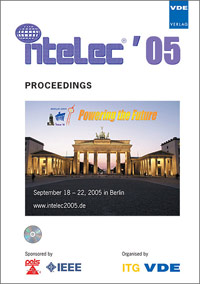Direct Methanol Fuel Cell Systems to supply small off-grid industrial equipment
Conference: Intelec '05 - Telecommunications Conference - 27th International Telecommunication Energy Conference
09/18/2005 - 09/22/2005 at Berlin, Germany
Proceedings: Intelec '05 - Telecommunications Conference
Pages: 4Language: englishTyp: PDF
Personal VDE Members are entitled to a 10% discount on this title
Authors:
Sonnde, Carola; Gruber, Michael (SFC SMART FUEL CELL AG, Eugen-Sänger-Ring 4, 85649 Brunnthal-Nord, Germany)
Abstract:
Operating small industrial equipment such as measuring instruments, sensors or weather stations, at remote locations requires reliable off-grid power supplies. The most common solution are large batteries, even though there are some inconveniences for the operator. Especially in northern regions, batteries can freeze during winter and suffer non-reparable damage. The exchange is strenuous at remote locations, due to the large weight and size of lead batteries. A more favourable and economic solution would be a fuel cell system, equipped for winter conditions, to supply the electrical energy. Another energy source that is often used, but not ideal, are photovoltaic modules (PV-modules). A common problem is that the PV-modules cannot cover the energy demand of the equipment during winter because the irradiation is very low. These facts suggest the development of a combination of PV-modules with fuel cells to get a more efficient, hybrid, energy supply. Existing energy supplies using PV-modules can be stocked up with a fuel cell easily, while new systems can be developed and laid out as hybrid systems. The object of this project is to develop a hybrid system consisting of a SFC A50 fuel cell and a PV-module. This hybrid system is meant to provide off-grid electrical equipment with a nominal power between 1 W and 20 W with energy. Numerous calculations were done using an idealized model, to optimise the system components for one specific application. The results have been verified in preliminary experiments. A demonstrator system consisting of a SFC A50, an Evergreen EC 110 PV-Module, a lead-acid battery and a charge regulator was built based on the optimisation. The components were assembled in a weather-proof cabinet. To improve the winter suitability of the SFC A50 system, a special insulation and a heat sink were added. The demonstrator was tested successfully over a time period of eight weeks, at temperatures between -35deg C and 30deg C. During this time, it was possible to improve the demonstrator's reliability so far that the construction of further test systems was planned. Currently (winter 2004/05), SFC has five systems running at different locations (e.g. Norway, Bavaria, Alps) afield.


